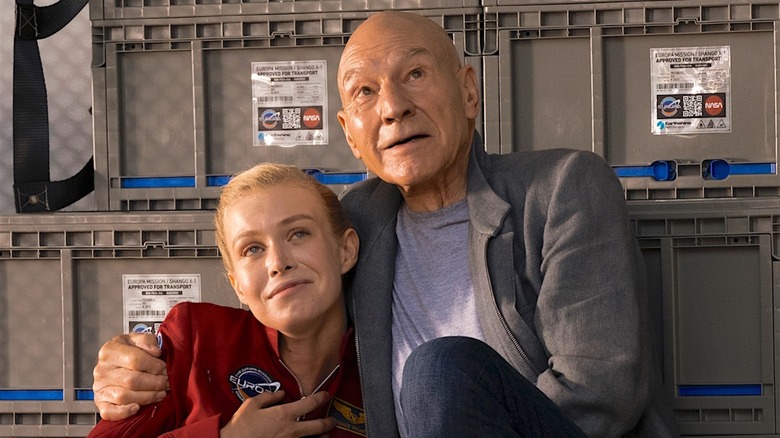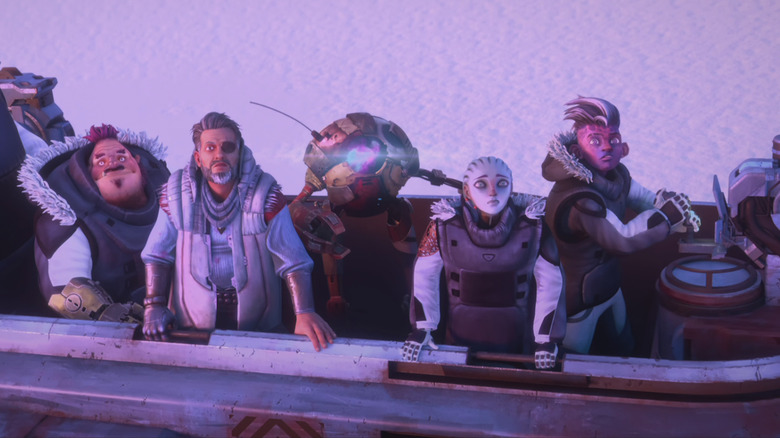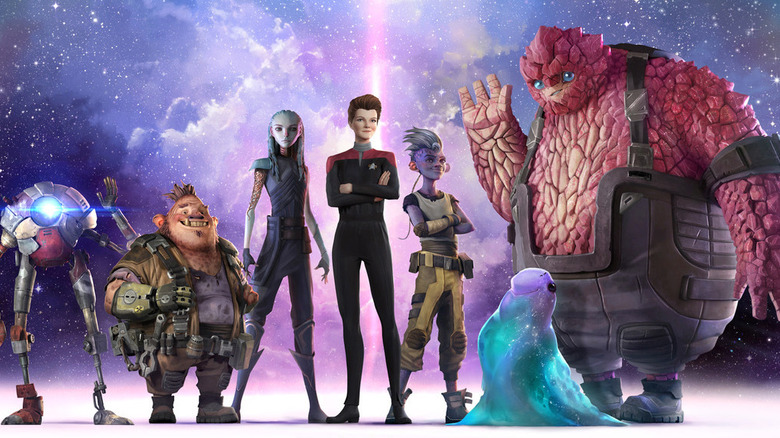What Does The Star Trek Universe Actually Look Like Outside Of Starfleet?
At last count, there have been 12 separate "Star Trek" shows in the franchise's history. With only one notable exception, each show takes place aboard a Starfleet facility — a starship or a space station — and follows the experiences of the people who work there. "Star Trek" is, after all, primarily a workplace drama, and many, many episodes are devoted to a ship's command structure, its operations, its separate departments. "Star Trek" is a very technical show, and many Trekkies find its rigidity and bureaucracy to be the paramount feature.
"Star Trek" is also notorious for skipping about in its own timeline, especially since new shows began airing on CBS All Access (now Paramount+) in 2017. "Star Trek: Discovery" takes place just prior to the original series, but a century after "Enterprise." Meanwhile, "Star Trek: Lower Decks" takes place a few years after the conclusion of "Star Trek: Voyager," and is more or less concurrent with the events of "Star Trek: Prodigy." "Star Trek: Picard" takes place after all of them, unless you count the latest seasons of "Discovery" which, thanks to a time warp, takes place 950 years beyond that. Through it all, however, Trek has remained largely within the confines of Starfleet vessels. The Federation is a very long-lived organization.
Of the shows named, "Picard" and "Prodigy" take place largely outside of the purview of Starfleet. "Picard" is about a retired Jean-Luc (Patrick Stewart) who does galavant around the galaxy in a starship, but with a team of hastily assembled rogues and civilians rather than a uniformed crew. "Prodigy" takes place aboard a Starfleet ship, but one that's occupied only by teens who had never heard of the Federation before.
Both shows depict life outside of Starfleet. A life that is ill-defined at best.
Civilians in a Starfleet world
The franchise's very title, of course, is predicated on trekking through the stars, so it always feels a little odd when "Star Trek" spends too much time on the ground. Civilians, throughout much of "Star Trek," are abstract. Occasionally Captain Picard might interact with one of the non-officers living on his ship, but there are few civilian characters overall (spouses and relatives notwithstanding). Only a character like Quark from "Star Trek: Deep Space Nine" lives outside Trek's military structure.
As such, the tastes of civilian life in "Star Trek" are few and far-between. Trekkies can easily imagine what life would be like on a starship, but what would life look like on a distant planet that Starfleet never visits? In pondering this notion, one begins to realize that the mythology of "Star Trek" is enormous, perhaps too sprawling for its own good.
What we know about the non-Starfleet world of Trek is that it's not a post-capitalist utopia like on military vessels. There is constant talk of money and profit and acquisition, and multiple characters reveal their dreams of being rich. Very occasionally, Starfleet will encounter a group of rogue weapons traders, implying that there is a vast black market for contraband explosives and the like. Starfleet may have been formed in a post-war society, but outside of Starfleet, worlds appear to be at war all the time.
Importantly, when a new species is introduced on "Star Trek," often there will be character moments or scenes of exposition explaining some of that species' philosophies and idiosyncrasies. It may not be realistic that every member of a given species would be devoted to a singular, unimpeachable ethos, but for dramatic purposes, it gives human viewers a shorthand.
So what is life like outside of Starfleet?
Outside of a Starfleet scenario, however, there is no need to have characters say things like "My species believes that ..." There are just people living their lives. There are agrarian species devoted to peace. There are anarchists who believe in murder. There are powerful godlike beings, aliens made of rock, creatures who exist as energy, cultures devoted to hunting. The Ferengi are devoted to profit, while Klingons live for honor and battle. The Trill form psychic bonds with long-lived invertebrates that they implant in their own bodies. The world of "Star Trek" is vast and varied and complicated.
The multiculturalism is a big part of Trek, but without a Starfleet vessel to synthesize this information, the world of "Star Trek" is, if one may forgive me, pretty generic.
Think about it. Take away the Starfleet vessels and specific Paramount-owned name brands, and "Star Trek" is not too much different from your average sci-fi board game. You are an alien cook, competing in a competition. You are fighting for honor in the alien court. You are constructing a space station and need to manage resources, but you are not humans. Early publicity shots of "Prodigy" revealed a cast of animated characters, all from unfamiliar species, all highly stylized, and possessed of no uniforms or other notable Trek iconography. Those characters, with no alterations, could have easily come from anywhere. It wouldn't be until the show actually aired that three of the characters would be cited as known Trek aliens (Tellarites, Meducans, Brikar).
There is, it seems, no single defining feature of "Star Trek" beyond the Federation. A "Star Trek" show set outside of Starfleet may as well be "Star Wars."
The constants
While Trek is devoted to the cultural bliss of infinite diversity in infinite combinations, it's vital that the main characters start from a utopian place. This is why a show like "Picard" is so frustrating. Picard is a principled man, but he is surrounded by depressed bounty hunters and murderers. In the first season of "Picard," the Federation is even revealed to have been corrupted by jingoism, refusing to help a historical rival in a time of crisis. Had "Picard" been about the main character's ideals standing strong in a time of decline — the tenacity of Starfleet's ethos — then it would be stronger as a drama. Instead, it's a mercenary show about killing others and stopping crises and facing personal problems. It never deals with philosophy or larger ideas. "Picard" is quite bad.
Upon reflection, I rescind the above comment about "Star Wars." There is something "Star Trek" possesses that "Star Wars" does not: science.
Warp engines on "Star Trek" can only take ships so fast and so far. "Star Trek" takes place comfortably within the Milky Way galaxy, and the show's writers understand that our galaxy is large enough that it cannot be traversed easily, even by the rules of its own fictional travel devices. "Star Wars" takes place in a fantasy world of wizards and Force Lightning. In "The Empire Strikes Back," Luke Skywalker (Mark Hamill) travels to a distant, distant swamp planet in a single-occupancy fighter craft. Can that ship travel at the speed of light? How long did he need to travel? In "Star Wars," such questions are irrelevant. What important is that he got there.
"Star Trek," despite the wild aliens and weird technology, is, at the end of the day, set in the real world. Or at least, a world with one foot in reality.



